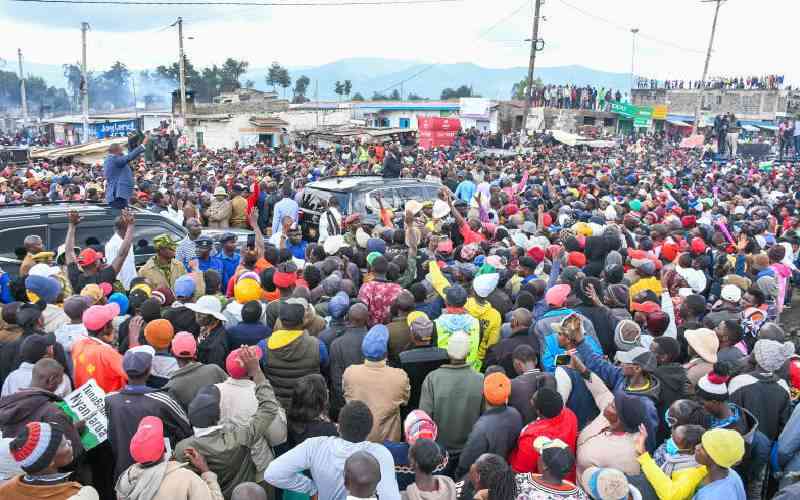There was a study by Hass Consultants last month that laid bare the status of Kenyan property market.
Although land in Upper Hill area remained the most highly valued with an acre going for Kshs.521 million and Ruaka the most expensive satellite town at Kshs.68.3 million an acre, the sector experienced a marginal decline in prices as demand in some suburbs fell due to oversupply.
This may seem insignificant for now but it is a pointer to a deep underlying problem that may eventually slow down Kenya’s economy, and drive us into chasms of economic recession.
The property market as it stands now in heavily saturated. It is starting to feel the effects of overinvestment and ridiculous pricing. It’s a bubble that is about to burst.
The rush to turn once lush, green countryside in to concrete jungle around the areas bordering major towns is myopic decision Kenya will regret later.
Ancient history teaches us that trading centers grew as a result of trade, agriculture and other economic activities and not monstrous constructions. Behemoth structures do not in actual sense translate into wealth creation.
The rise and rise of property prices in Kenya has defied basic economics mostly because valuation is not based on logical calculation of returns on investments but on speculative tendencies by greedy landowners.
Thousands of acres of coffee trees in Kiambu have given way to monstrous buildings which now occupy every available space. Kiambu used to be Nairobi’s bread basket supplying the city with potatoes, vegetables, sweet potatoes, cassava, yam, bananas and dairy products. All these have been hastily uprooted to pave way for rental buildings.
Lack of planning in our major towns has also been our Achilles’ heel. The previous demarcations of low, middle and high density has been largely ignored giving rise to haphazardly constructed flats in previously serene environment of Karen, Loresho, Kileleshwa among others.
Lack of affordable housing has led tenants to occupy cheap death traps erected that emulate Eastlands.
I think that now Kenyan property prices have exceeded their elastic limits and this can only result to one consequence; recession.
Just like investors on the Nairobi Stock Exchange who have lost billions in the last two years, current property owners will certainly not realize full returns on their investments.
A look around Nairobi Central Business District brings about a shocking revelation. Most stalls are empty after tenants closed business as a result of high taxes and ridiculous rental prices or leases.
In 2011 around Luthuli Avenue, a 5 x 5 feet stall rent ranged between Kshs.30000 to 75000 depending on its proximity to the nearest street. When you factor in licenses, labor charges and other overheads, you realize you need to make a profit of at least Kshs.5000 per day to stay afloat.
Many people have opted to close shop in the CBD and relocate to cheaper areas in the estates than stay put and fall under the hammer.
Stay informed. Subscribe to our newsletter
When the property bubble bursts, it usually affects a country’s economy particularly banks, mortgage firms and insurance companies. In Kenya’s case co-operative movement will also be hard hit.
The 2007-2009 USA depression emanated from bursting of the housing bubble. It was preceded by a fall in stock prices.
As is the case in Kenya, the prices of houses in US had tripled between 1999 and 2007. People borrowed heavily at high interests from banks to buy homes.
Most investors ditched other economic activities and invested in real estate which promised high returns. Oversupply and loans default eventually brought these investments tumbling down. The sector experienced market price correction.
Market price correction will eventually occur in Kenya. It is logical to put mitigating measures to prevent a Greece-type melt down.
Kenyans need to be advised to venture into other sectors like manufacturing and agriculture to diversify as opposed to the current scenario where most entrepreneurs are into cheap Chinese imports, second hand cars, mtumba and real estate.
Consequences of a recession are catastrophic.
 The Standard Group Plc is a
multi-media organization with investments in media platforms spanning newspaper
print operations, television, radio broadcasting, digital and online services. The
Standard Group is recognized as a leading multi-media house in Kenya with a key
influence in matters of national and international interest.
The Standard Group Plc is a
multi-media organization with investments in media platforms spanning newspaper
print operations, television, radio broadcasting, digital and online services. The
Standard Group is recognized as a leading multi-media house in Kenya with a key
influence in matters of national and international interest.
 The Standard Group Plc is a
multi-media organization with investments in media platforms spanning newspaper
print operations, television, radio broadcasting, digital and online services. The
Standard Group is recognized as a leading multi-media house in Kenya with a key
influence in matters of national and international interest.
The Standard Group Plc is a
multi-media organization with investments in media platforms spanning newspaper
print operations, television, radio broadcasting, digital and online services. The
Standard Group is recognized as a leading multi-media house in Kenya with a key
influence in matters of national and international interest.





